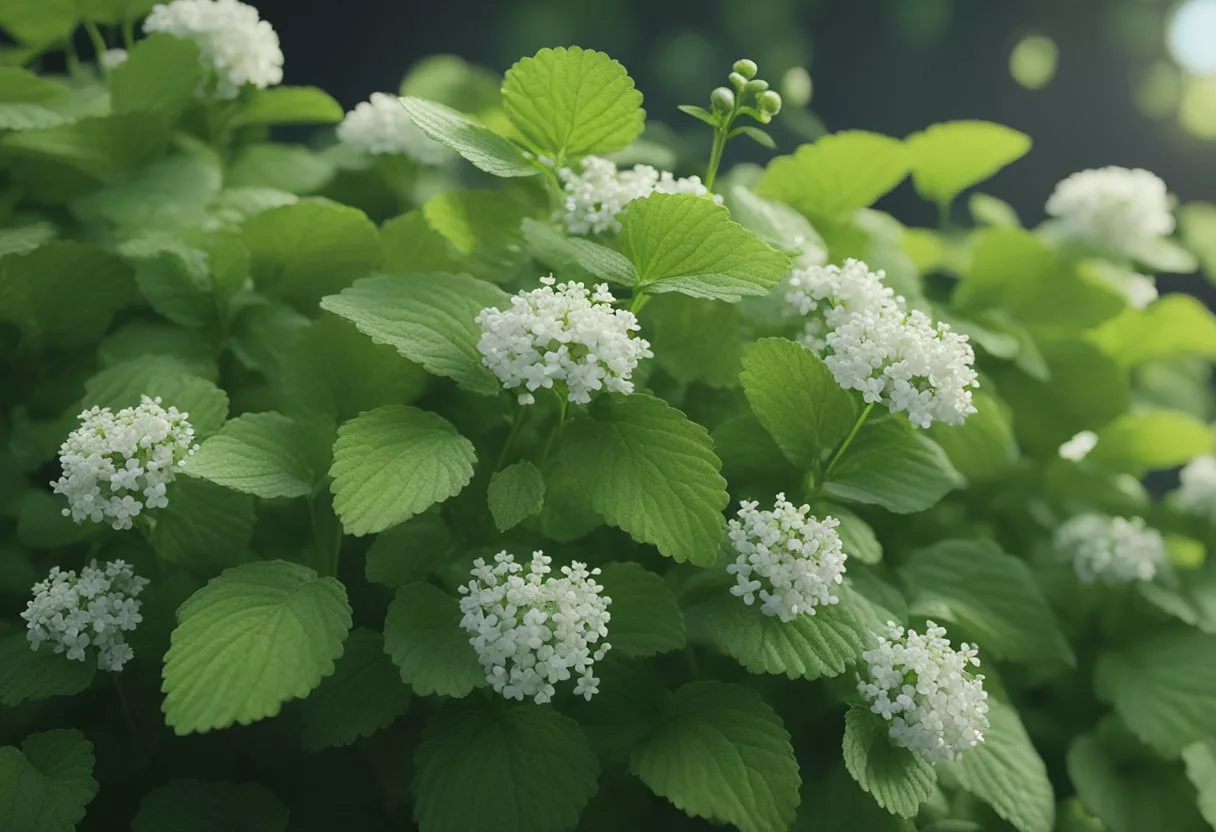Lemon balm has been used for centuries as a natural remedy to promote health and well-being. Often found in teas, oils, and extracts, this versatile herb is praised for its calming and soothing properties.

But what exactly makes lemon balm so beneficial to our health? This article dives into seven key benefits that highlight the value of incorporating lemon balm into your daily routine.
1) Reduces Anxiety

Lemon balm can be an effective herb for reducing anxiety. Studies show that consuming lemon balm can lead to lower levels of stress. This might be linked to its ability to increase GABA levels in the brain, which promotes calmness.
In one pilot study, 0.3 grams of lemon balm extract in a drink helped reduce stress and improved mood in young adults. Another study on rats showed anti-anxiety effects, indicating its potential for human use.
Lemon balm can be taken in various forms. It can be consumed as a tea by infusing dried leaves in hot water. People can also use tinctures, with a recommended intake of up to 60 drops per day. Capsules and extracts are other popular methods.
The presence of terpenes in lemon balm is another reason for its anxiety-reducing properties. These compounds help those with severe memory issues feel less anxious. Including lemon balm in daily routines might offer a natural way to manage anxiety.
2) Supports Sleep Quality

Lemon balm, also known as Melissa officinalis, has been used for centuries to help with sleep.
Research indicates that lemon balm can reduce sleep disturbances and improve overall sleep quality. Studies show benefits from consuming lemon balm extracts or teas. This herb’s calming properties make it a popular choice for those seeking natural sleep aids.
One study found that a combination of valerian and lemon balm improved sleep in women experiencing menopause and insomnia. This suggests that lemon balm might be particularly helpful for improving sleep during periods of hormonal changes.
Lemon balm reduces anxiety and stress, which often cause sleeplessness. Its anxiolytic properties can help calm the mind, making it easier to fall asleep and stay asleep.
Children and adults alike may benefit from lemon balm. In one study, a combination of valerian and lemon balm was shown to promote healthy sleep cycles in restless children.
For those interested in trying lemon balm for sleep, it can be consumed as a tea, extract, or capsule. This makes it a flexible option for different preferences and needs when addressing sleep issues.
3) Enhances Cognitive Function

Lemon balm (Melissa officinalis) is known for its potential to enhance cognitive function. This herb, which is related to mint, has been used historically to improve memory and mental clarity. Recent studies support these traditional uses.
Research has shown that lemon balm can help improve memory and attention. In experiments, participants consuming lemon balm extracts performed better in memory tests compared to those who did not.
There is also evidence that lemon balm may aid those with Alzheimer’s disease. A study found that lemon balm extract could improve cognitive function in patients with mild to moderate Alzheimer’s.
Lemon balm can be consumed in various forms such as in teas, capsules, or as an additive in foods. Some find it helpful as part of their daily routine to stay mentally sharp.
The calming properties of lemon balm might also contribute to better cognitive function by reducing stress and anxiety. When people are less stressed, they tend to think more clearly and concentrate better.
4) Improves Digestion

Lemon balm can be beneficial for digestion. It has been used historically to soothe upset stomachs. The herb may help reduce symptoms like nausea and bloating.
Lemon balm can help address various gastrointestinal issues. These include indigestion and gas. Some people use it to calm the stomach muscles.
This herb might also help with colic in infants. Modern studies are still exploring their full potential. Many people find using it in teas or extracts helps them.
For those with mild digestive issues, lemon balm could be a gentle solution. It is easy to prepare in different forms. Herbalists often recommend it for its calming effects on the digestive system.
Using lemon balm tea seems the most straightforward method. To prepare, infuse the leaves in hot water. This can be done a few times a day. It is a natural approach that many find effective. More research is needed to fully understand all its benefits.
Lemon balm is a versatile herb. Its long history of use makes it a well-known natural remedy.
5) Eases Menstrual Cramps

Lemon balm is known for its soothing properties. It’s from the mint family and is often used to calm nerves.
Studies suggest that lemon balm can help reduce menstrual cramps. This herb may also relieve symptoms of premenstrual syndrome (PMS).
A 2015 study found lemon balm effective in reducing menstrual cramps. The study noted that participants experienced less pain during their period.
Using heat and light exercise also helps with cramps. Lemon balm can be a gentle addition to these methods, providing additional relief.
Lemon balm is available as a tea, supplement, or essential oil. Many find the tea to be a simple way to incorporate it into their routine.
Lemon balm’s potential to ease menstrual pain isn’t just modern knowledge. It has been traditionally used for this purpose for many years.
For those seeking natural remedies, lemon balm could be a valuable option. It can be part of a holistic approach to managing menstrual discomfort.
Some sources support light physical activities combined with lemon balm for better relief.
6) Reduces Inflammation

Lemon balm has notable anti-inflammatory properties. It contains compounds that help reduce the activity of white blood cells and inflammatory cytokines. These compounds can lower inflammation in the body.
Alcohol extracts of lemon balm have been shown to reduce pain and swelling in mice. This effect is likely due to its ability to block certain inflammatory pathways.
Studies also indicate that lemon balm can lessen inflammation caused by injury. Its effectiveness in reducing specific inflammatory proteins makes it a valuable herb for alleviating inflammatory conditions.
For further information, visit Lemon Balm: Benefits, Uses, and More.
7) Boosts Mood

Lemon balm is well-known for its mood-enhancing properties. Studies show that this herb can ease symptoms of stress and promote relaxation. For example, a 2004 study found that participants who took lemon balm reported feeling calmer and less alert after being subjected to stress.
Regular use of lemon balm may help improve overall emotional well-being. By interacting with GABA-A receptors in the brain, this herb may reduce anxiety and induce a sense of calm. This makes it a popular choice for those dealing with mild depression or chronic stress.
Lemon balm can be consumed in various forms, such as teas, capsules, or essential oils. Each method has benefits, but all aim to provide mental health support. Drinking lemon balm tea, for instance, can be a soothing ritual that helps boost your mood.
Whether taken as a supplement or used in aromatherapy, lemon balm offers a natural way to lift your spirits. People who use lemon balm often report an improved mood and a more relaxed state of mind. This versatile herb is a great addition to daily routines for those seeking emotional balance.
What Is Lemon Balm?

Lemon balm (Melissa officinalis) is a lemon-scented herb from the mint family. Historically, it has been valued for its calming properties. Today, it is widely used for its potential health benefits, including reducing anxiety and improving sleep quality.
Historical Use of Lemon Balm
Lemon balm has a rich history dating back to Ancient Greece and Rome. It was often used in traditional medicine to treat a variety of ailments. The Greeks and Romans applied it to heal wounds and insect bites.
Medieval European herbalists praised lemon balm for its ability to uplift the spirit. Monks grew lemon balm in monastery gardens for its purported medicinal properties. It was commonly used in tinctures and teas during this period.
Lemon Balm in Modern Herbal Medicine
In modern times, lemon balm is popular in alternative medicine. Studies suggest it may help reduce anxiety and improve mood. For instance, a small pilot study found that consuming a lemon balm extract drink reduced stress in young adults.
Lemon balm is also renowned for improving sleep quality. People use it in various forms such as tea, oil, or supplements. According to Dr. Axe, it may help with issues like overactive thyroid and PMS symptoms. Its versatility makes it a staple in many herbal medicine cabinets.
Nutritional Profile and Active Compounds of Lemon Balm

Lemon balm is rich in essential oils, antioxidants, vitamins, and minerals. These properties contribute to its health benefits, making it a valuable herb for various therapeutic uses.
Essential Oils and Antioxidants
Lemon balm contains essential oils like citral, citronellal, and geranial. These oils give the herb its calming and mood-lifting properties. Additionally, lemon balm is high in rosmarinic acid, a potent antioxidant that helps reduce inflammation and protect cells from damage.
Another important compound is eugenol, which has antimicrobial and pain-relieving effects. The combination of these oils and antioxidants makes lemon balm effective for stress relief and improving mood, as suggested by various studies.
Vitamin and Mineral Content
Lemon balm provides several important vitamins and minerals. It contains vitamin C, which supports immune function and skin health. The herb also has small amounts of vitamin A, which aids in vision and cellular health.
Key minerals in lemon balm include magnesium, calcium, and potassium. Magnesium helps muscles and nerves function properly, calcium supports bone health, and potassium regulates blood pressure. These nutrients, though present in small quantities, add to the herb’s overall health benefits.
Frequently Asked Questions

Lemon balm offers various health benefits, such as supporting anxiety relief, improving sleep quality, and enhancing cognitive function. It can be consumed in teas, capsules, or applied topically for skin benefits. However, it’s important to be aware of potential side effects and specific uses.
What are the potential skin benefits of using lemon balm?
Lemon balm may help soothe and heal minor skin irritations. It contains properties that can reduce inflammation and redness. Some people use lemon balm oil for cold sores due to its antiviral properties. It might also help with acne by reducing bacteria on the skin.
Can lemon balm have adverse effects on the heart?
There isn’t strong evidence that lemon balm affects heart health negatively. However, it’s always wise to consult a healthcare professional before consuming new supplements, especially for those with preexisting heart conditions. Lemon balm is generally considered safe for most people.
How might lemon balm tea improve health?
Lemon balm tea can improve health by reducing anxiety and promoting relaxation. It may also improve sleep quality and digestion. Drinking lemon balm tea provides a calming effect, which can benefit mental health and help with stress management.
What impact does lemon balm have on anxiety relief?
Lemon balm has compounds that may help reduce anxiety and stress. Studies suggest it can improve mood and cognitive function. Consuming lemon balm in various forms, like teas or capsules, can offer relief from mild anxiety symptoms, making it a popular choice for stress management.
Are there any known side effects associated with consuming lemon balm tea?
Most people tolerate lemon balm tea well, but some might experience mild side effects. These can include nausea, dizziness, or allergies. If any adverse reactions occur, stop consuming and consult a healthcare professional. Always start with small amounts to gauge tolerance.
Does lemon balm contribute to weight loss efforts?
There’s limited evidence suggesting lemon balm directly aids weight loss. Its primary benefits are related to stress and anxiety reduction, which might indirectly support weight management by improving overall well-being and potentially reducing stress-eating habits. More research is needed in this area.